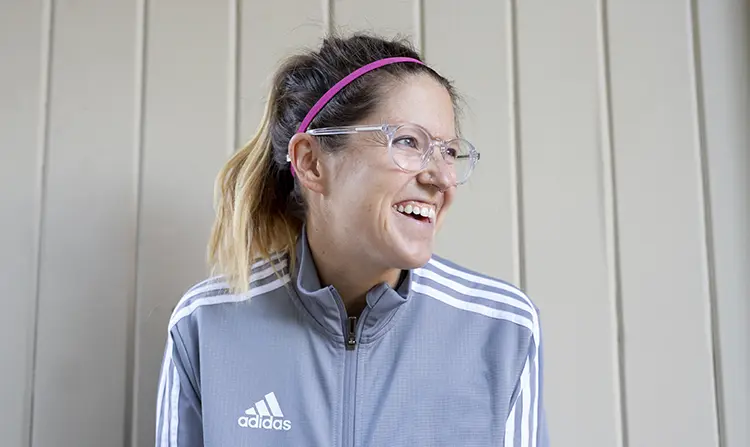
If you are currently trying to make a decision about how to pick team captains, either as a soccer player who has to vote and choose between teammates, or as a coach who is assigning the roles themselves – this post will help you. We know that choosing captains can be a difficult decision, so we wrote this post to help you pick the best people for the job and to help your team avoid it turning into a popularity contest (again).
This Post Contains:
How to pick team captains
So, what does a good team captain look like? When choosing captains, you want to pick players that lead by example, players that are extremely inclusive and care about the well-being of others. Players that are hard-working and invested in their own personal growth. Players that are authentic, know themselves well and are not too wrapped up in what others think about them.
When choosing team captains, you want to pick players that do what they say they will do – aka have strong integrity. They need to be players who are GOOD PEOPLE. Players that know how to balance things, such as being kind yet competitive at the same time. Players that work hard, but still know how to have fun. Players that will be able to lead your team with a healthy striving mentality and players that understand the power of a strong collective. Players that are selfless, not selfish.

7 Attributes to look for when choosing captains
- On field leadership and confident communication in the run of play
- Respectful and appreciative of teammates
- Organized and takes initiative
- Reliable on and off the field, honest and trustworthy
- Mature, growth-minded, and a team player that understands the importance of every role on the pitch
- Hard working and takes responsibility for their actions, a good role model
- Supportive & encouraging, inspires and motivates their teammates in the face of adversity

What if I'm still having a hard time choosing captains?
When the time arrives to be choosing captains, a good way to gauge it is to ask yourself this question: “will the group benefit from something this player has to offer (in the way of leadership)? Yes? Then – make them a team captain!
How many captains on a soccer team?
When choosing captains in soccer, you should have as many or as few as your team needs to have a well-rounded group in the leadership role. 1-2 soccer team captains is typical, but your team shouldn’t limit themselves if having more would be better for the group. It really depends on your team and what they need. It also depends on who your players are and what their leadership qualities are.

There might be someone who is particularity strong at on-field leadership and communication, and then another who is more organized, takes initiative and can even run some activities on their own. And then a third who is very supportive and encouraging to everyone when things go wrong. This is when you choose multiple captains and build a well-rounded leadership team with players who compliment each other.
One of the biggest benefits of having multiple soccer team captains is that you can cover a lot more ground when it comes to high quality traits. It’s kind of like building your own ‘super-captain’! Last year I chose 4 soccer captains for my U15 girls competitive travel team. While I know that some people will think this is way too many, it was perfect for our team dynamics (each player had their own specific role that they were great at) and WE THRIVED because of it.
What about having no official captains, but instead a rotation?
Soccer team captain responsibilities

Something to be aware of and try to avoid, is being a team captain with just a title and no actual impact. Quite often, soccer players get chosen as team captains, but then aren’t empowered by coaches to lead and take on some of the collective leadership responsibility. When this happens, it often result in them not being very effective captains because they weren’t given any guidelines, responsibilities or autonomy to take action and implement anything.
Specific roles
As a captain, you want to be actively involved in the building of team culture. As a coach, you want to give your team captains encouragement, and permission, to help guide the direction of the team.
When soccer team captains are actively involved in leadership decisions, they are more invested and want to work hard for the team to make a positive impact. When they feel they are valued and trusted by the coaching staff, this trickles down to everyone else on the team, leading to an overall culture of caring, collaborative teammates all working hard for the group. This is when the ‘we’ becomes more powerful than the ‘me’. For everyone.

- Being in charge of the ‘Skill of the Day’, something the players can work on as they arrive to soccer training. Captains come up with it and write it on a whiteboard for the team to see before every training session.
- Organizing and leading warmups & technical drills before practices and games.
- Pumping soccer balls and making sure equipment is organized and ready to go before training.
- Creating ball mastery or fitness challenges for players to work on individually outside of training.
- Leading team-building activities and planning things for the group to do together outside of training.
- Encouraging teammates through some kind of weekly ‘captain’s award’, maybe recognizing players for something that they did that was thoughtful or kind and not even soccer related.
Grow your confidence through preparedness.

Subscribe to our email list to
Get your FREE Weekly Soccer Planner!
We respect your privacy. Unsubscribe anytime.
An argument for letting coaches choose team captains
With middle and high school soccer teams specifically, or with any teams that are newly formed or have short seasons – I am a strong proponent of letting the coach be the one choosing captains. Teams that have been playing together for awhile though, such as in competitive and year-round programs, have a deeper trust of each other and will be better at electing the right leaders than a team who isn’t as familiar with each other on a personal level.
Avoiding the popularity contest
Choosing captains is a growth opportunity
After all of this careful assessment, my biggest piece of advice is ironically quite small and simple: go with your gut. If you feel like someone will be a good leader, trust that feeling. Your intuition is usually right, and if it isn’t, if you end up picking someone that wasn’t quite ready or quite right for the job – then THAT’S OK. It will be a learning opportunity none the less.
Coaches, if choosing captains didn’t result in the best people making the cut, work with what you have. Motivate them, encourage them, help them fill the gaps where they lack and GROW into the role of being a good captain. This will make YOU a stronger coach, THEM a stronger captain, and BOTH OF YOU stronger leaders for your team.

Hi everyone! I’m Jenn and I create content to help female soccer players and coaches maximize individual and team potential by developing healthy mindset skills. Join other subscribers and sign up for the newsletter for all my best tips and advice!
We respect your privacy. Unsubscribe anytime.








